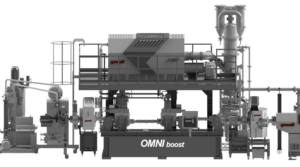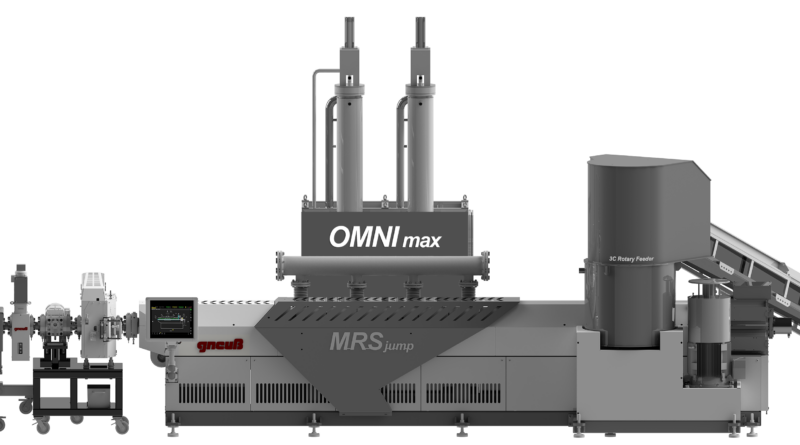Degassing and decontamination technologies
Gneuss, hall 9 – booth A22
Gneuss presents their new series of Omni recycling machines: the MRS extrusion technology has proven itself as an alternative for the reprocessing of contaminated materials like polyester, polystyrene, polypropylene or polyethylenes. In combination with the Gneuss rotary filtration systems and optimised vacuum technology, customisable recycling lines tailor-made for a specific material can be engineered. Several Letters of Non-Objection (LNOs) from the FDA, EFSA conformity and local approvals in Latin America confirm the decontamination efficiency of the technology. Samples of PP tubs for food applications made with 30% post-consumer PP and PS sheet made from 30% post-consumer PS, processed on the Omni recycling machines with MRS extruders and RSFgenius filtration systems, will be on display.
Omni recycling machine for post-consumer fibre or thermoform reclaim
The company will be showing its new machinery for recycling needs with a complete Omni recycling machine featuring a new 3C rotary feeder, an MRSjump 70 extruder, a fully automatic melt filtration system RSFgenius 90 and an online viscometer VIS, for the processing of 200 kg/h (450 lbs/h) of undried and uncrystallised polyester (PET) thermoform reclaim.
3C rotary feeder
The newly developed 3C rotary feeder makes it possible to use low bulk density materials without any external processing steps. A conveyor belt feeds shredded reclaim material into the hopper, where a fast-rotating disc with knives cuts, compacts and pre-conditions the material. The knives add energy into the material and start the heating and degassing process before the material is automatically fed into the MRSjump extruder.
MRSjump
The MRS extruder is based on conventional single screw technology but is equipped with a multiple screw section for devolatilisation. It enables efficient and gentle decontamination of PET, whilst achieving the requirements for direct food contact standards. The MRS extruder permits the processing of rPET directly into high quality end products such as packaging sheet, strapping tape or filaments without pre-drying by using a simple and rugged vacuum system. This is achieved by means of its unique and patented processing section. The multi rotation section is a drum containing multiple satellite single screws, driven by a ring gear and pinion transmission.
The satellite screws rotate in the opposite direction to the main screw. This disproportionately increases the surface exchange of the polymer melt. A large opening for venting, exposing the full length of the satellite screws, is completely under vacuum. This provides good and unrestricted access to the polymer melt, the surface of which is constantly replaced at a high rate by the action of the satellite screws in the multiple screw section. The surface area and the surface area exchange rate, available for devolatilisation, are greater than in other extrusion systems, says Gneuss. As the thermal and mechanical stress on the polymer melt is minimised, PET processed on the MRS extruder has good optical and mechanical properties.
The new MRSjump has a longer, modified version of the Multi Rotation Section, which is claimed to ensure both a longer residence time of the material and more surface area exchange under vacuum. The longer multi rotation section, coupled with a powerful vacuum system operating at 1 mbar, can be used to boost the viscosity of rPET and to hold it at a stable level in spite of variations in the input material. There is thus no need for any liquid phase (LSP) or solid-state polymerisation (SSP). With the stabilisation and/or increase of the intrinsic viscosity in the extrusion process, the MRSjump is claimed to be well suited to recycling e.g. PET film waste or fibre reclaim – applications for which direct recycling with one single extrusion step was previously impossible due to low intrinsic viscosity or variable input viscosities. In combination with Gneuss’ rotary filtration technology, a high melt purity is guaranteed. Quality assurance can be provided with an online viscometer VIS for measuring melt viscosity.
As demand for PET bottle flakes outpaces supply and processors are looking for alternative feedstock (e.g. to fulfil recycled content mandates) the MRSjump offers a solution for PET thermoform, film or fibre recycling, while the newly developed MRS cutter compactor makes it possible to use low bulk density materials. In parallel, with company headquarters only about 200 km from the show, a complete PET sheet extrusion line with an Omnimax recycling machine – consisting of an MRSjump 70, Gneuss’ deep vacuum system and a fully-automatic filtration system RSFgenius 75 – and a sheet downstream with a 500 mm wide extrusion will be running in Gneuss’ technical centre open to visitors.

Omniboost recycling machine including polyreactor jump
Additionally, an Omniboost recycling machine with a polyreactor jump will be operating in the company’s technical centre for an online demonstration. The jump can lift the IV value of a PET melt up to 0.95 dl/g. In the jump the polymer passes over several slow turning elements which create a polymer film, the surface of which is constantly renewed. The reactor vessel is kept under vacuum, through which volatile substances are reliably removed. By regulating the residence time in the reactor, the vacuum, the fill level and the speed of rotation of the agitating devices, the polycondensation reaction can be altered to achieve the required product properties. The jump is a robust and reliable liquid state polycondensation system (LSP) and a compact, quick and efficient alternative to conventional solid-state systems (SSP). It enables direct reintroduction of the polymer into the production process without the need to remelt the PET.

